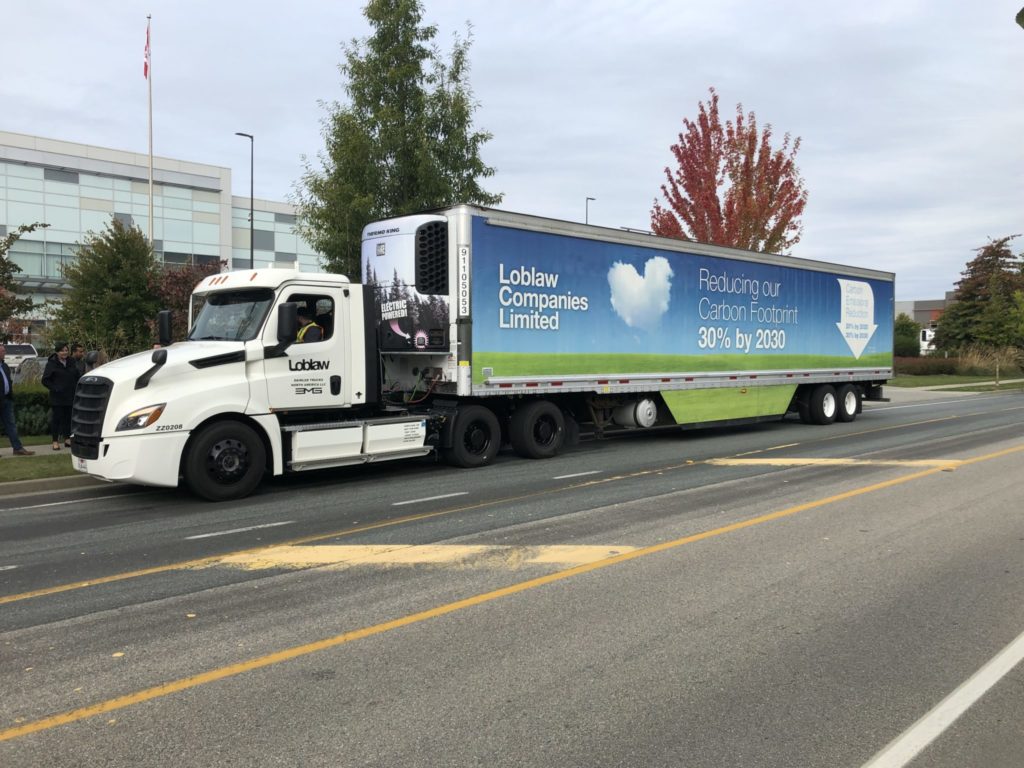B.C. truckers face massive change, challenge in 2021
LANGLEY, B.C. – British Columbia’s trucking industry faces an array of changes and challenges in the coming year, as it prepares for mandatory entry-level driver training, ELDs, the dawn of electric trucks, and more.
Mandatory entry-level training (MELT) for new truck drivers was to be announced in September, but is now expected “quite early” in 2021, said British Columbia Trucking Association (BCTA) president and CEO Dave Earle, in an online address to members.

While the association expects a six-month transition process, it has yet to learn what the curriculum will look like. But Earle expects a high benchmark in terms of training hours.
“B.C. is the only jurisdiction west of Quebec that doesn’t have a Mandatory Entry Level Training standard. That’s not going to continue,” he said. “The other standards run anywhere from 103, 111 to 121 hours. I will guarantee you that we will have more than 121 hours.”
Truck driver shortage
That will introduce the challenge of higher training costs as the province continues to grapple with an intensifying truck driver shortage.
The province’s truck driver shortage increased 302% between 2015 and 2019, leaving 3,710 vacant positions despite a 10% bump in wages when compared to the fourth quarter of 2017. On average, 2/3 of carriers face 14.7 days of truck downtime every six months because of the driver shortage, Earle said.
“We’re rapidly coming back to where we were at the end of 2019,” he added.
“If you’re having trouble finding drivers, there’s a good reason why. They’re not out there.”

Caution with ELDs
Other changes on the horizon include electronic logging devices and speed limiters, he said. While federally regulated carriers will face an ELD mandate in June 2021, the association is also expecting a provincial mandate.
Still, BCTA is advising members to exercise caution when investing in ELDs, stressing the need to ensure that a provider has a device that’s certified for use in Canada.
“Nobody as of today is certified in Canada,” Earle said.
“Please, exercise caution. If you’re making investments to go forward on this, make sure that you wait until such time that you can be absolutely assured that the product you’re buying is going to work and is compliant with federal law after June 2021.”

Electric trucks and fuel-saving devices
Even trucks themselves are evolving.
Pilot projects to come in the first half of 2021 will see fully-electric Class 8 trucks on B.C. roads, Earle said. “Manufacturers are all over the place bringing these tools and equipment to market.”
In this case, there is government support in the form of rebates, he noted, encouraging fleets to enter the electric vehicle space.
Other support is available for fleets that want to introduce fuel-saving technologies.
“The provincial government is providing incentives for motor carriers to adopt fuel-saving technology,” Earle said, referring to the recently renewed CleanBC Heavy-duty Vehicle Efficiency Program. That offers rebates for up to 30 to 50% of eligible equipment costs, to a maximum of $15,000 pre vehicle or $100,000 per fleet.
“We’re looking at Year 3 being signed off in the near future.”
Covid-19 challenges
It’s a period of intense change, and it’s coming as B.C. carriers continue to struggle with the effects of Covid-19.
While trucking companies have seen business recover somewhat since the world came to a “screeching halt” in March, motor coach businesses have been decimated. In a series of surveys conducted by BCTA, they’ve seen revenue drop 90%. Temporary layoffs have become permanent layoffs.
“I have never, ever seen this kind of average revenue drop in any sector,” Earle said. “There’s no other word for this than ‘catastrophic.’”
Truck fleets have fared better, but experience challenges of their own.
Truck volumes at the northbound Pacific Highway border crossings have reached 95% of the levels seen in 2019, but this masks challenges that remain, Earle said. While vehicles are moving, they aren’t always full.
“That resiliency in the supply chain just hasn’t come back yet.”
Earle stressed he is proud of the work the association did to help address needs in the early weeks of Covid-19. When truck drivers were shut out of restaurants, it engaged fast food chains and tracked down food trucks for rest stops.
While bulk supplies of hand sanitizer were available, it worked with counterparts at the Manitoba Trucking Association to source smaller bottles that would be useful in trucks. BCTA reached out to ensure that drivers would be insured for Covid-19 medical bills, and joined the public in thanking truckers during through the Thank a Trucker campaign mounted by the Canadian Trucking Alliance.
Amidst it all, it was monitoring changes as diverse as federal tax code changes, medical deadlines, extensions for inspections, and new cross-border protocols.
Staff found themselves fielding calls from drivers who didn’t know what to do, and were scared to cross the border. It didn’t matter if they were a BCTA member or not, Earle said. They provided information and discussed the manageable nature of the risk.
“It was a terrible time. It was a time of great challenges and successes,” he said. “I never want it to do it again.”
Have your say
This is a moderated forum. Comments will no longer be published unless they are accompanied by a first and last name and a verifiable email address. (Today's Trucking will not publish or share the email address.) Profane language and content deemed to be libelous, racist, or threatening in nature will not be published under any circumstances.
Im a trucker and have been for 33 years and it sucks , no Benifits work 12 hour shifts for straight time , work graveyards and weekends, have no life and the car drivers now a days are complete assholes ,the company’s are finally getting what they deserve it’s a horrible profession now and i laugh at the winning company’s complaining about driver shortage like why don’t you want to live in a truck for $50,000 a year before taxes .
Need better pay & owner operator need better rates .
The #1 reasons. All other related issues are to benefit the the drivers . Load boards & load brokers pushing for cheap rates. Running loaded or empty should have min rate $3 per mile . Waiting time . And waiting at Walmart for you trailer for 3-5 day without pay . Nothing wrong about The Melt program EDL . Safety for drivers should be taken in consideration. Fuel , insurance., maintenance $ equipment all gone up in price but not driver pay why??
There is no shortage of truck drivers. The problem in Ontario is new truck drivers can not get insurance with small Trucking companies or bus companies. The bus companies need gov to pay the plates and insurance and part of the bus drivers wages up to 75 percent of the first $26 per hour. All local truck and bus drivers should be able to get $24.00 per hour after 3 years experience. Wheel chair vans at least $19.00 per hour. O T R truck and bus drivers should get $28.00 per hour with overtime after 10 hours per day and 50 hours per week. B C is much better than Ont for providing insurance for new bus, truck and wheel chair taxis. The new higher training standards are a good idea. No new truck or bus foreign drivers should come until 90 percent of the population has got the vaccine. All companies bringing in foreign workers should have to pay for and supply housing for them and their families for the first 3 years. All shippers and receivers need to provide parking when loading and unloading for the rest of the 10 hours break. Many truck drivers and Vets are in homeless shelters in Ontario Canada. The program that B C has to help reduce fuel use should also be in Ontario and M B with limit of 10,000 per truck or $50,000 per company.